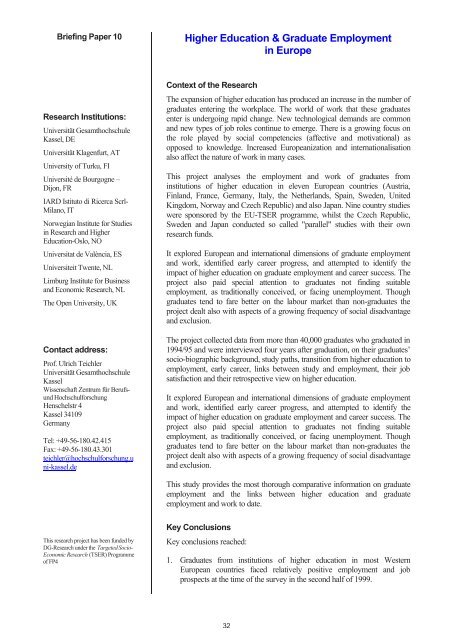briefing papers for policy makers
briefing papers for policy makers
briefing papers for policy makers
Create successful ePaper yourself
Turn your PDF publications into a flip-book with our unique Google optimized e-Paper software.
Briefing Paper 10<br />
Research Institutions:<br />
Universität Gesamthochschule<br />
Kassel, DE<br />
Universität Klagenfurt, AT<br />
University of Turku, FI<br />
Université de Bourgogne –<br />
Dijon, FR<br />
IARD Istituto di Ricerca Scrl-<br />
Milano, IT<br />
Norwegian Institute <strong>for</strong> Studies<br />
in Research and Higher<br />
Education-Oslo, NO<br />
Universitat de València, ES<br />
Universiteit Twente, NL<br />
Limburg Institute <strong>for</strong> Business<br />
and Economic Research, NL<br />
The Open University, UK<br />
Contact address:<br />
Prof. Ulrich Teichler<br />
Universität Gesamthochschule<br />
Kassel<br />
Wissenschaft Zentrum für Berufsund<br />
Hochschul<strong>for</strong>schung<br />
Henschelstr 4<br />
Kassel 34109<br />
Germany<br />
Tel: +49-56-180.42.415<br />
Fax: +49-56-180.43.301<br />
teichler@hochschul<strong>for</strong>schung.u<br />
ni-kassel.de<br />
This research project has been funded by<br />
DG-Research under the Targeted Socio-<br />
Economic Research (TSER) Programme<br />
of FP4<br />
Higher Education & Graduate Employment<br />
in Europe<br />
Context of the Research<br />
The expansion of higher education has produced an increase in the number of<br />
graduates entering the workplace. The world of work that these graduates<br />
enter is undergoing rapid change. New technological demands are common<br />
and new types of job roles continue to emerge. There is a growing focus on<br />
the role played by social competencies (affective and motivational) as<br />
opposed to knowledge. Increased Europeanization and internationalisation<br />
also affect the nature of work in many cases.<br />
This project analyses the employment and work of graduates from<br />
institutions of higher education in eleven European countries (Austria,<br />
Finland, France, Germany, Italy, the Netherlands, Spain, Sweden, United<br />
Kingdom, Norway and Czech Republic) and also Japan. Nine country studies<br />
were sponsored by the EU-TSER programme, whilst the Czech Republic,<br />
Sweden and Japan conducted so called "parallel" studies with their own<br />
research funds.<br />
It explored European and international dimensions of graduate employment<br />
and work, identified early career progress, and attempted to identify the<br />
impact of higher education on graduate employment and career success. The<br />
project also paid special attention to graduates not finding suitable<br />
employment, as traditionally conceived, or facing unemployment. Though<br />
graduates tend to fare better on the labour market than non-graduates the<br />
project dealt also with aspects of a growing frequency of social disadvantage<br />
and exclusion.<br />
The project collected data from more than 40,000 graduates who graduated in<br />
1994/95 and were interviewed four years after graduation, on their graduates’<br />
socio-biographic background, study paths, transition from higher education to<br />
employment, early career, links between study and employment, their job<br />
satisfaction and their retrospective view on higher education.<br />
It explored European and international dimensions of graduate employment<br />
and work, identified early career progress, and attempted to identify the<br />
impact of higher education on graduate employment and career success. The<br />
project also paid special attention to graduates not finding suitable<br />
employment, as traditionally conceived, or facing unemployment. Though<br />
graduates tend to fare better on the labour market than non-graduates the<br />
project dealt also with aspects of a growing frequency of social disadvantage<br />
and exclusion.<br />
This study provides the most thorough comparative in<strong>for</strong>mation on graduate<br />
employment and the links between higher education and graduate<br />
employment and work to date.<br />
Key Conclusions<br />
Key conclusions reached:<br />
1. Graduates from institutions of higher education in most Western<br />
European countries faced relatively positive employment and job<br />
prospects at the time of the survey in the second half of 1999.<br />
32


